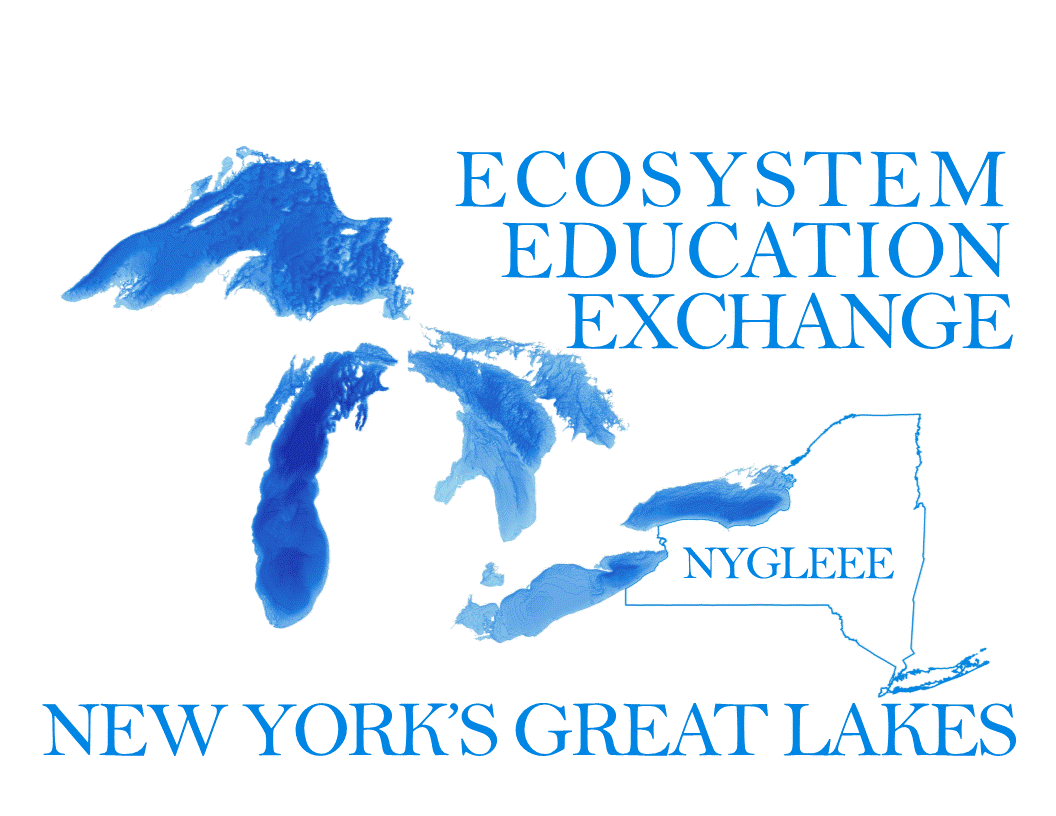New York's Great Lakes Ecosystem Education Exchange

ABOUT NYGLEEE
New York's Great Lakes Ecosystem Education Exchange (NYGLEEE) is a program administered by New York Sea Grant and the New York State Department of Environmental Conservation, partnering with educators in New York's Great Lakes watershed to develop an experiential environmental education program focusing on Great Lakes Literacy Principles and stewardship
NYGLEEE GOALS
- Ensure the next generation is prepared to make sound decisions that consider and contribute to improving the health of New York’s Great Lakes, including water quality, natural resources and social impacts.
- Encourage K-12 students to pursue careers in fields such as water quality management, environmental engineering, habitat protection, and environmental education.
NYGLEEE STRATEGIES
- Expanding and improving on efforts to develop NY’s Great Lakes education programming
- Providing resources such as materials, issue-based learning opportunities, and curricula for Great Lakes and watershed-related hands-on classroom and field experiences
- Empowering educators to encourage students in K-12 classrooms and programs to become stewards of the watersheds where they live
ECOSYSTEM EDUCATION EXCHANGE CLEARINGHOUSE
What is the NYGLEEE Clearinghouse?
New York Sea Grant and the New York State Department of Environmental Conversation have launched a website that will serve as an environmental education clearinghouse and will provide a portal through which users can access resources for schools and nature center programs that integrate Great Lakes Literacy Principles with classroom instruction and hands-on field experiences.
What are the NYGLEEE Clearinghouse Goals?
- Create and maintain ties of the curricula to current NYS Common Core/National Learning Standards
- Serve as a resource providing information on environmental careers and educational institutions
- Promote standards-based curricula with components of
- Placed-based education
- Project/problem-based learning
- Service learning opportunities
- Stewardship opportunities
-
Identify gaps in
- Current curricula
- Capacities of organizations among different Great Lakes sub-basins
GREAT LAKES MODEL EDUCATORS NETWORK
What is the GLME Network?
A community of teachers and educators with the common goal of promoting Great Lakes literacy and stewardship in K-12 classrooms and nature center programs throughout NY’s Great Lakes Basin. Great Lakes Model Educators (GLME) are environmental educators who have participated in Great Lakes workshops or trainings and have demonstrated successful integration of Great Lakes Literacy Principles and related curricula into their K-12 classroom or program. Be part of a network of peers promoting Great Lakes environmental stewardship and providing each other with shared professional development and educational experiences.
What are the GLME Goals?
- Host Great Lakes-focused workshops in coastal sub-basins throughout New York State
- Opportunities to help educators become GLME
- Create and utilize NYGLEEE Basin Bins with information, materials, and resources for teachers and educators to integrate Great Lakes Literacy Principles and related curricula into their classrooms. Bins will be available throughout NYS. Please visit the NYGLEEE website below to view those locations.
Apply to Become a GLME
Individuals may be K-12 teachers of any discipline, nature center or environmental education center educators, instructors, or outreach and education specialists with non-profit organizations.Individuals may apply or recommendations for a deserving educator will also be accepted. The full application must be completed and submitted to
New York Sea Grant for review.
Download the full application here (pdf).
NYGLEEE works to support Great Lakes environmental education, the Model Educator program, promote environmental education initiatives and support stakeholder efforts and partnerships in pursuing outside funding opportunities. NYGLEEE achieves outreach and education and coordination goals of the NY Great Lakes Action Agenda, fostering environmental literacy, awareness of issues and promoting stewardship. This program was developed with funding from the Environmental Protection Fund, in support of the Ocean and Great Lakes Ecosystem Conservation Act of 2006.